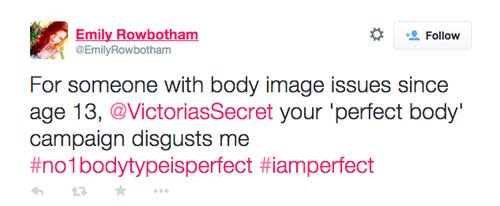Petition Calls for Victoria's Secret to Pull 'Perfect Body' Ads

Victoria’s Secret is sending mixed messages. The lingerie company is being criticized for its new advertising campaign for its new line of push up bras. The images causing controversy feature Angels Lily Aldridge, Behati Prinsloo, and Jasmine Tookes with the words “The Perfect Body” displayed across the poster.
While the ads look no different than others Victoria’s Secret has promoted throughout its history — tall women with chiseled abs, long limbs, and about 0 percent body fat — the juxtaposition of the very thin models with the words that seemingly state a specific and often unattainable standard for what a flawless figure should look like. This significance attached to the ads, though unintentional, has angered many and some are even asking for the brand to make significant changes to their policies.

First spotted in the U.K., many voiced their concerns on Twitter and after seeing the poster at a mall in Leeds, students Frances Black, Gabriella Kountourides, and Laura Ferris created a change.org petition. “Every day women are bombarded with advertisements aimed at making them feel insecure about their bodies, in the hope that they will spend money on products that will supposedly make them happier and more beautiful,” the group writes. “This marketing campaign is harmful. It fails to celebrate the amazing diversity of women’s bodies by choosing to call only one body type ‘perfect.’” They believe — as do the more than 3,000 people who have signed in support of their crusade since Monday — that media messages such as these perpetuate low self-esteem among women and girls who are made to feel inadequate and unattractive by not fitting into the narrow benchmark of what is considered beautiful.
The college students also started a hashtag movement across social media channels by asking people to tweet with the hashtag #iamperfect.






But Victoria’s Secret isn’t alone in inadvertently communicating unhealthy body image messages. According to the National Eating Disorders Association, research has indicated that media has a powerful effect on women’s dissatisfaction with their bodies. Images such as the Victoria’s Secret ad can promote thin ideal internalization and lead to disordered eating. “Of course we find the phrase ‘a perfect body’ offensive and demeaning. There is no such thing as who determines such a meaningless standard. All this type of hype does is make people question their own body image and self-esteem,” Lynn Grefe, President and CEO of NEDA, tells Yahoo Style. "Our goal should be health and respect for our own individuality. Shame on Victoria’s Secret, but this is not exactly a surprise since they do not in any way set the example for body diversity and self-esteem at all shapes and sizes.”

